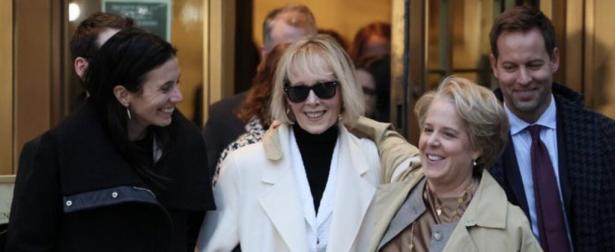The $83.3 million defamation judgment that writer E. Jean Carroll won Friday against Donald Trump will soon reveal the depth of his finances, long shrouded in smoke and mirrors, disclaimers that his financial statements are not to be trusted, and outright fabrications about his income and wealth.
The secret: does Trump have the money to pay Carroll?
Trump says he’ll appeal. He has few grounds to challenge the federal court judgment. But if Trump does appeal, it will open the curtain on his murky finances, where inflated valuations and concealed obligations are common.
Trump testified almost a year ago that he was sitting on $400 million of cash. Be skeptical. Don’t discount the prospect that Donald conflated his personal money with cash from his MAGA fundraising operations, which by law cannot be used to pay Carroll.
Appealing will require Trump to either deposit the entire judgment amount with the court or obtain a bond covering 20% of the judgment, close to $17 million.
If you were in the financial business, would you loan any money to Trump? What if he offered to pay a fat fee upfront? A high-interest rate? What real estate would you take as collateral to back the bond, knowing that if the appeal fails, Trump will fight to keep you from collecting?
As early as this week, Trump expects a Manhattan judge to impose a fine of more than $300 million for persistent financial fraud.
Naked Claim
Even if Trump had $400 million cash a year ago, an unverified claim, he has faced enormous legal and other bills since then. At the same time, his golf courses in Ireland and Scotland continued losing money, public records in London show.
The Carroll case and the expected New York State civil judgment for persistent fraud would consume 96% of the cash he claimed without proof.
Suppose Trump can’t financially qualify to pursue an appeal. In that case, Carroll can enforce judgment, seizing cash in bank accounts and pitting liens on properties such as the portion of Trump Tower that Trump still owns and Mar-a-Lago in Florida. That would take time and cost Trump a small fortune in legal fees—he has a history of stiffing his lawyers—to delay paying Carroll. Meanwhile, interest costs will add to the $83.3 million obligation.
Trump hopes that an appeals court will find the damages award excessive. Death cases, after all, are often settled for a few million dollars, sometimes a few hundred thousand.
He is unlikely to prevail because the jury awarded $18.3 million in compensatory damages and $65 million in punitive damages. As a rule, courts respect punitive awards of less than six times actual damages. This punitive award was about 3.6 times the compensatory damages.
The punitive damages are intended, as Carroll lawyer Roberta Kaplan told the federal court jury, to get Trump to stop lying about Carroll. After Ean earlier trial Trump was judged to have raped Carroll in a Bergdorf-Goodman department store dressing room and to have lied about it in repeated attacks on Carroll. More than two dozen other women have accused Trump of rape or sexual assault.
Trump insists he never met Carroll and “she’s not my type.” During a pretrial deposition he was shown a photo of himself and his first wife facing E. Jean Carroll and her then husband. Trump misidentified Carroll as his second wife, Marla Maples. When his lawyer interrupted to repair the damage Trump asserted that the sharply focused image was blurry.
Photo of Trump and his first wife facing E. Jean Carroll and her then husband. In sworn testimony Trump said misidentified Carroll as Marla Maples, his second wife, then claimed the image was blurred.
Knowing Trump, I doubt he will stop attacking Carroll. His emotional state and views about women, frozen in puberty, and his declining mental health and cognitive capacity will not facilitate a proper change in conduct.
Fantasy Finances
Trump’s finances have always been exercises in fantasy. For example, in 1985, he bought Mar-a-Lago for $10 million. He claimed it was a cash purchase with no mortgage. I have in my home a Chase bank executive’s letter to Trump promising never to file the Mar-a-Lago mortgage at a courthouse, as banking laws require.
One reality is that Trump borrowed 125% of the purchase price, taking $2 million for himself while claiming he paid from his supposed rich cash deposits. A second is that bankers who declare their illegal conduct rarely get prosecuted or even disciplined, so weak is government regulation of finance in America.
The same year he bought Mar-a-Lago with the hidden mortgage, Trump also acquired the nearly finished Hilton Casino in Atlantic City. He paid with a $325 million loan, from which he shaved off a $5 million fee for himself.
Eventually, he owned three Atlantic City casinos, yet he never invested a dime in that New Jersey resort town. It was all borrowed money. Because he took fees for himself from the loan proceeds, his investment was less than zero, just as with Mar-a-Lago.
Only a foolhardy or corrupt banker would issue Trump a bond enabling his appeal of the $83.3 million award to E. Jean Carroll. If Trump fails to meet the financial qualifications for an appeal, there’s one thing we’ll know for sure: the man who ran for president claiming he was worth more than $10 billion is so financially weak that when an 80-year-old woman grabbed him by the wallet, he couldn’t perform.
David Cay Johnston co-founded DCReport. He is a best-selling author and investigative journalist who for 13 years reported for The New York Times. Johnston is a specialist in economics and tax issues. He won a 2001 Pulitzer Prize. He teaches at Syracuse University College of Law.
About DCReport: DCReport is published by the Next Echo Foundation. We are a unique, not-for-profit service that provides reporting, information, and perspective on the policies, politics, and events that affect our everyday lives and futures. We do so to protect your rights as citizens, consumers, workers, investors and voters.
DCReport is participatory civic media in action, propelled by the belief that we must democratize the stories and the storytellers for our national narrative. Thus, a large focus of our coverage has shifted to feature more content about issues relative to marginalized communities, and written or produced by members of those communities. Those are the voices often never heard, despite being the voices that we all most need to hear from.
We are founded on core investigative journalism principles of research, fact-checking, and reporting in plain English how you and your family are affected by what happens in Washington, D.C. and in government and policy at state and local levels.
We will never tell you what to do; we will equip you with facts and perspectives so you can decide and make your voice heard despite official barriers to citizen involvement in decisions by our government.
DCReport was co-founded by Pulitzer Prize-winning journalist David Cay Johnston, author of seven books including The Making of Donald Trump, and most recently, The Big Cheat: How Donald Trump Fleeced America and Enriched Himself and His Family, and David Crook, a veteran journalist who was the founder and editor of The Wall Street Journal Sunday.



Spread the word